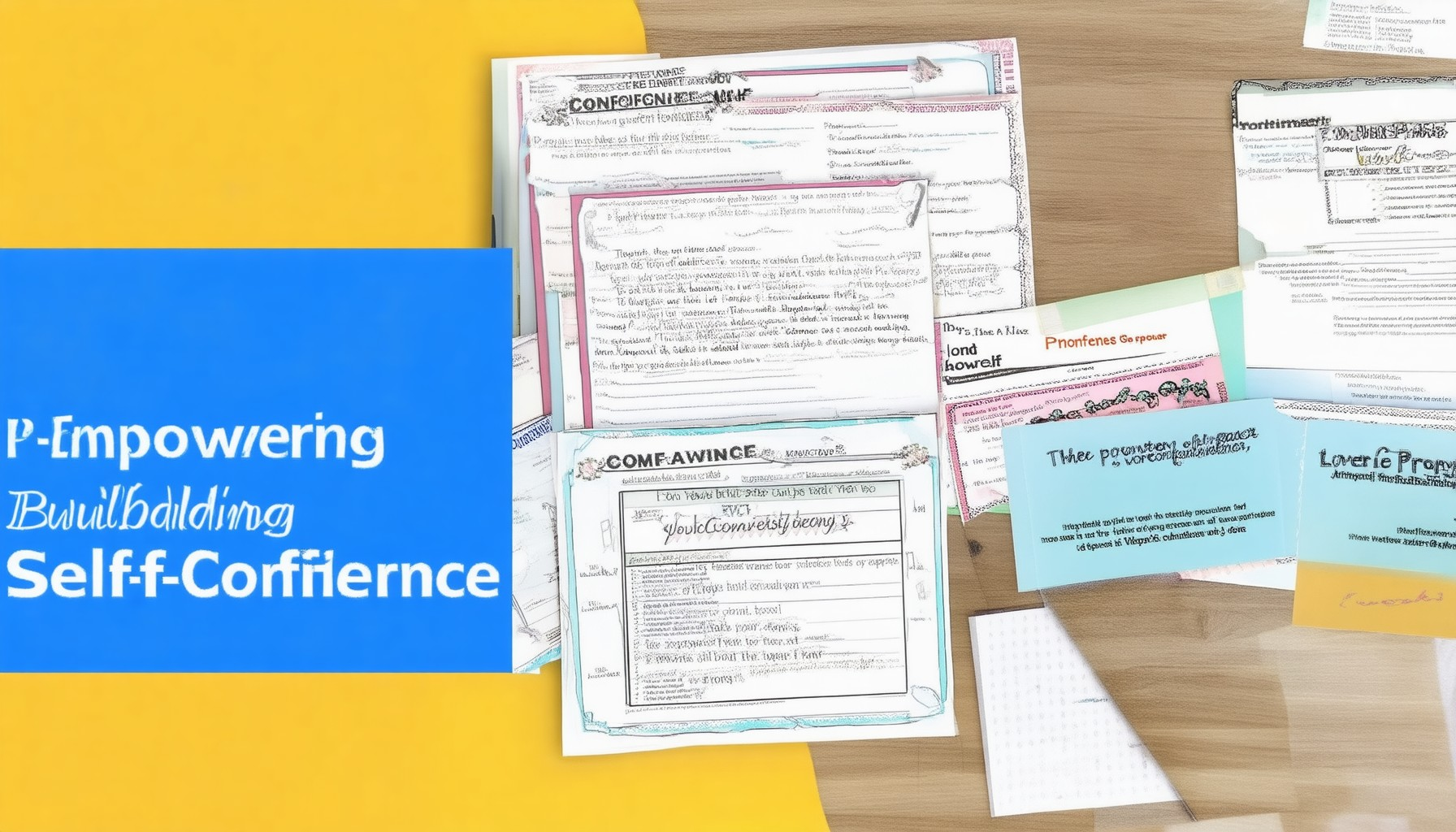Building self-confidence is a journey that many struggle to undertake, often feeling overwhelmed by insecurities and doubts. Whether you’re seeking to overcome fear, improve your self-esteem, or achieve personal growth, this guide offers proven strategies and actionable tips to help you cultivate the mindset and habits needed to embrace self-assuredness. From understanding the root causes of self-doubt to exploring effective practices for building resilience, this comprehensive resource equips you with the tools to step out of your comfort zone and embrace life with newfound confidence. By addressing both mental and practical aspects of self-confidence, this article provides a holistic approach to fostering self-assurance, helping you unlock your potential and live life with purpose and clarity.
Key Takeaways
– Master the Basics of Self-Confidence: Understand that confidence grows from competence and positivity, earned through consistent effort and progress.
– Set Achievable Goals: Break down long-term objectives into manageable tasks and track your progress to build momentum and belief in your abilities.
– Practice Gratitude Daily: Acknowledge your achievements, no matter how small, and surround yourself with positive influences to foster self-assurance.
– Embrace Failure as Growth: View mistakes as learning opportunities and use past experiences to approach future challenges with greater confidence.
– Challenge Negative Thoughts: Replace self-doubt with positive affirmations and practice mindfulness to stay focused during difficult moments.
– Build a Supportive Network: Surround yourself with encouraging friends, family, and mentors, and seek feedback from trusted individuals to validate your growth.
– Prioritize Physical Health: Engage in regular exercise to boost energy and maintain clarity, avoiding excessive alcohol and caffeine to stay confident.
– Take Calculated Risks: Step out of your comfort zone to build resilience and prepare for outcomes to stay confident.
– Be Patient and Consistent: Understand that confidence grows over time with persistent effort, celebrating small victories to stay motivated.
– Invest in Professional Development: Continuously learn and enhance your skills through courses, workshops, or mentorship to stay competitive and confident.
– Leverage the 4 Ps of Confidence: Develop self-efficacy, self-confidence, social confidence, and emotional intelligence to create a balanced sense of self-assurance.
– Use Proven Strategies: Implement proven methods like self-reflection, goal setting, public speaking, and visualization to build and sustain self-confidence.
– Incorporate Practical Exercises: Engage in daily gratitude practices, embrace feedback, and participate in physical activities to boost mood and reduce anxiety.
How to Train Yourself to Be Confident
Building confidence requires consistent effort and practice. Here’s a structured approach to help you develop self-assurance:
- Set Achievable Goals:** Start with small, manageable tasks to build momentum. Celebrate each accomplishment, no matter how minor, to boost your belief in your abilities.
- Reframe Failure:** View setbacks as opportunities to grow rather than as personal shortcomings. Learn from mistakes and use them as stepping stones toward success.
- Practice Self-Compassion:** Treat yourself with kindness, as you would a friend. Engage in positive affirmations and remind yourself of past successes during tough times.
- Gradual Exposure:** Confront fears incrementally. Begin with low-stakes situations and gradually move to more challenging environments, using past triumphs as reminders of your capabilities.
- Visualization:** Imagine successful outcomes in your mind. This mental rehearsal can help you internalize confidence and reduce anxiety in real-life scenarios.
- Track Progress:** Use tools or apps to monitor your achievements and milestones. This visibility can motivate continued growth and provide a sense of accomplishment.
- Health and Wellness:** Prioritize adequate sleep, nutrition, and exercise. These factors contribute significantly to overall confidence and emotional well-being.
- Seek Support:** Surround yourself with positive influences who encourage and uplift you. Share your journey with trusted friends and family for added motivation.
- Celebrate Wins:** Acknowledge and reward your progress to reinforce positive habits. This practice helps solidify confidence and keeps you motivated.
What Causes Lack of Self-Confidence?
Lack of self-confidence can stem from various factors, each influencing individuals differently. Here’s a breakdown of common causes:
- Unfavorable Upbringing:** Critical or perfectionist parents or caregivers can instill a sense of inadequacy. Their high expectations may lead to feelings of failure, eroding self-worth.
- Academic Struggles:** Consistent academic underperformance can diminish belief in one’s intellectual capabilities, leading to a lack of confidence in handling challenges.
- Stressful Life Events:** Prolonged stress from events like relationship issues or financial troubles can negatively impact self-perception, making it hard to view oneself positively.
- Social Comparisons:** Constant exposure to others’ perceived success or confidence on social platforms can create unrealistic standards, fostering self-doubt.
- Unresolved Trauma:** Past negative experiences, such as workplace setbacks or personal trauma, can linger, affecting self-assurance and self-belief.
- Lack of Recognition:** Not receiving acknowledgment for achievements can lead to feelings of undervaluing oneself, weakening confidence.
- Health Issues:** Chronic health problems can complicate self-perception, making it challenging to maintain a positive self-image.
- Social Anxiety:** Fear of judgment or criticism in social settings can hinder engagement, perpetuating self-doubt and reducing confidence.
- Negative Self-Talk:** Constantly criticizing oneself can reinforce a negative self-image, making it difficult to recognize personal strengths.
- Financial Struggles:** Financial instability adds pressure, often correlating with feelings of inadequacy and reduced self-worth.
- Missing Personal Goals:** Without clear objectives, individuals may feel stagnant, leading to a lack of motivation and self-belief.
How to Build Real Self-Confidence
To cultivate genuine self-confidence, start by understanding and leveraging your unique strengths while also addressing areas for growth. Here’s a structured approach:
1. Know Yourself
Self-awareness is the foundation of confidence. Take time to understand your abilities, weaknesses, and values. Acknowledge what makes you unique and how you can leverage these traits to your advantage.
2. Set Realistic Goals
Setting achievable objectives helps build momentum. Whether it’s personal development or career-related, breaking larger goals into smaller, manageable steps fosters a sense of accomplishment and progress.
3. Practice Positive Self-Talk
Challenge negative self-talk by replacing doubting thoughts with affirmations. Remind yourself of past successes and current strengths to reinforce a positive mindset.
4. Learn from Mistakes
Embrace failure as a learning opportunity rather than a setback. Every mistake is an opportunity to grow and improve, which strengthens your belief in your abilities.
5. Seek Feedback
Valuable insights come from others’ perspectives. Regularly ask for feedback and use it constructively to identify blind spots and areas for improvement.
6. Surround Yourself with Supporters
Become part of a community or network that uplifts and inspires you. Positive influences can mirror your confidence and motivate you to succeed.
7. Practice Gratitude
Focusing on the positives in your life shifts your mindset toward abundance and self-worth. Reflect daily on things you’re grateful for to foster a confident attitude.
8. Engage in Activities You Enjoy
Pursue hobbies or interests that bring you joy and fulfillment. Confident people often align their passions with their lives, creating a sense of purpose and satisfaction.
9. Prioritize Physical Health
Exercise regularly, eat nourishing foods, and get enough sleep. Physical well-being directly impacts energy levels and mental sharpness, contributing to overall confidence.
10. Take Calculated Risks
Step out of your comfort zone to embrace new challenges. Confident individuals are willing to take informed risks, knowing they have the skills to navigate uncertainties.
11. Embrace Imperfection
Recognize that no one is perfect. Accepting your imperfections allows you to focus on growth and progress rather than chasing unrealistic ideals.
By consistently applying these strategies, you can build a strong foundation of self-confidence that enables you to tackle challenges and thrive in various aspects of life.
What Are the 10 Steps for Building Self-Confidence?
- Understand Self-Confidence Basics
- Recognize that self-confidence stems from competence and positivity.
- Know that confidence is earned through consistent effort and progress.
- Set Realistic Goals
- Break down long-term objectives into smaller, manageable tasks.
- Track your progress to build momentum and belief in your abilities.
- Practice Gratitude Daily
- Focus on acknowledging your achievements, no matter how small.
- Surround yourself with positive influences and uplifting messages.
- Embrace Failure as a Learning Tool
- View mistakes as opportunities for growth rather than setbacks.
- Learn from past experiences to approach future challenges differently.
- Challenge Negative Thoughts
- Identify and replace negative self-talk with positive affirmations.
- Practice mindfulness to stay present and focused during challenging moments.
- Build a Strong Support Network
- Surround yourself with encouraging friends, family, and mentors.
- Seek feedback from trusted individuals to gain perspective and validation.
- Prioritize Physical Health
- Engage in regular exercise to boost energy and mood.
- Avoid excessive alcohol and caffeine to maintain clarity and confidence.
- Take Calculated Risks
- Step out of your comfort zone to build resilience and self-assurance.
- Prepare for potential outcomes before taking risks to stay confident.
- Be Patient and Consistent
- Understand that confidence grows over time with persistent effort.
- Celebrate small victories to stay motivated and engaged.
- Seek Professional Development
- Continuous learning helps you stay updated and competitive.
- Invest in courses, workshops, or mentorship to enhance your skills.
What are the 4 Ps of Confidence?
The 4 Ps of confidence refer to four distinct components that contribute to overall confidence levels:
- Self-Efficacy: This is the belief in one’s ability to successfully handle specific situations or challenges. It’s about trusting your skills and abilities in particular contexts.
- Self-Confidence: This is a broader concept encompassing overall belief in oneself, including your capabilities, values, and worth. It’s about feeling competent and capable in various aspects of life.
- Social Confidence: This involves the ability to navigate social interactions effectively, communicate clearly, and present oneself confidently in group settings.
- Emotional Intelligence: This refers to the ability to manage and regulate emotions, understand others’ feelings, and respond appropriately in different situations. High emotional intelligence supports confident behavior.
To enhance your confidence, consider focusing on each of these areas individually:
- Build Self-Efficacy: Set personal goals and work toward achieving them to strengthen your belief in your abilities.
- Cultivate Self-Confidence: Practice positive affirmations and surround yourself with supportive influences.
- Develop Social Confidence: Engage in social activities and practice active listening and communication skills.
- Enhance Emotional Intelligence: Learn stress management techniques and seek ways to improve empathy and understanding.
By addressing each of these components, you can develop a more balanced and sustained sense of confidence in various aspects of your life.
Exercises That Build Self-Confidence
Building self-confidence requires consistent effort and practice. Here are some effective exercises that can help you develop and strengthen your self-confidence:
-
Self-Reflection
Take time daily to reflect on your achievements and strengths. Write them down to reinforce your positive qualities.
-
Goal Setting
Set achievable goals and track your progress. Celebrate each milestone to build momentum and belief in your abilities.
-
Public Speaking
Volunteer to speak in front of others. Whether it’s a small group or a larger audience, this helps you overcome fear and boosts confidence.
-
Physical Activity
Engage in regular exercise to release endorphins that improve mood and reduce anxiety. Strength training and cardiovascular workouts are particularly effective.
-
Visualization
Imagine yourself succeeding in your goals. Spend a few minutes each day visualizing your success to instill confidence in your abilities.
-
Learning New Skills
Pursue new skills or hobbies. Mastery in a new area enhances your self-esteem and provides a sense of accomplishment.
-
Gratitude Practice
Start a gratitude journal and note three things you’re thankful for each day. This habit fosters positivity and self-assurance.
-
Embracing Feedback
Seek feedback from trusted individuals and use it constructively. Recognize areas for improvement while celebrating your strengths.
By consistently practicing these exercises, you can cultivate a stronger sense of self-confidence that carries over into various aspects of your life.









0 Comments